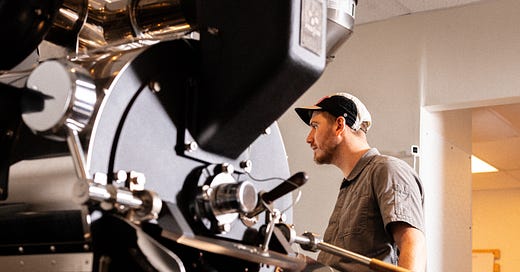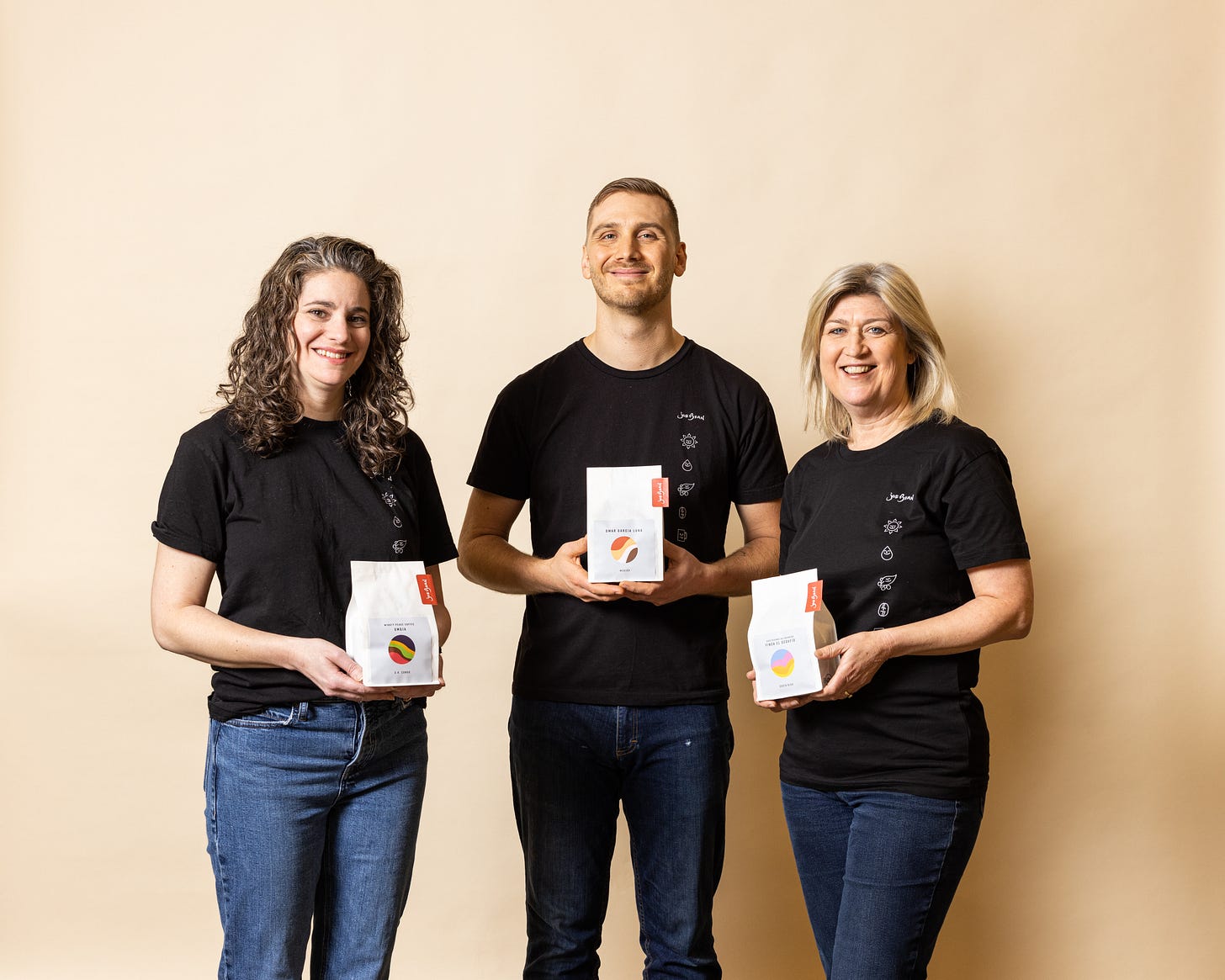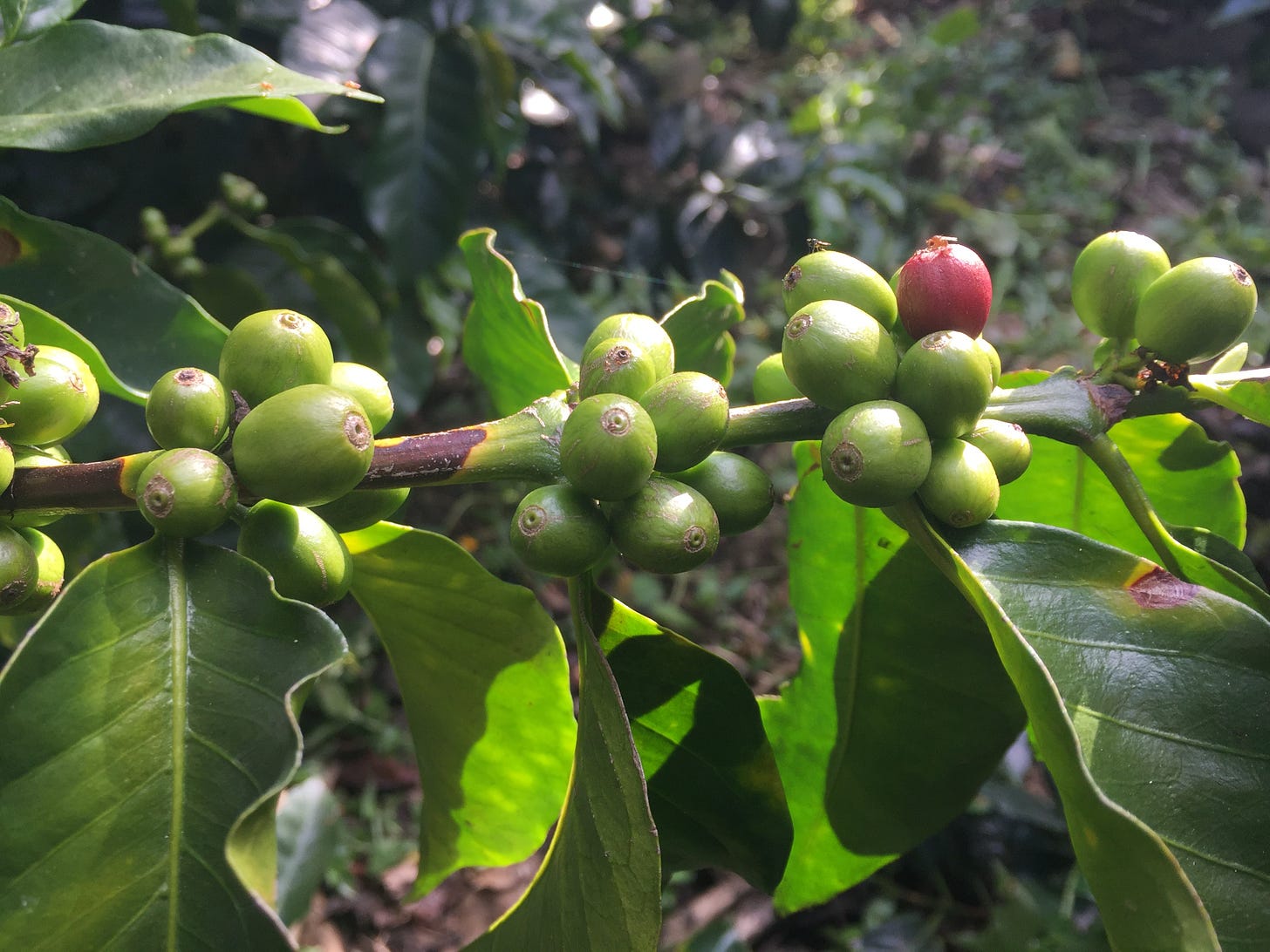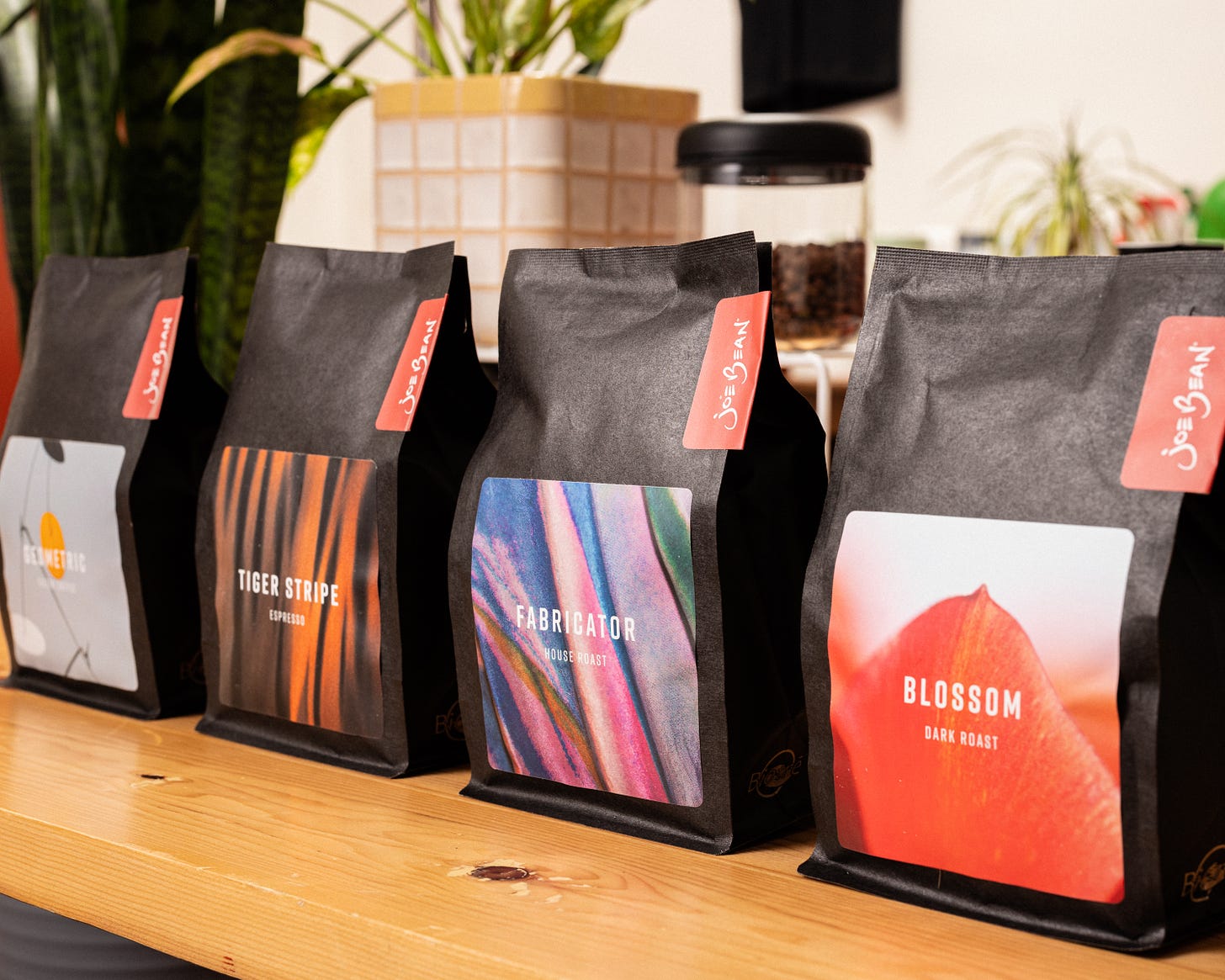Joe Bean Roasters brings a global perspective to coffee
Utilizing unexpected partnerships and ethically sourced coffee, Rochester-based roaster is bringing worldly coffees to this area and beyond
Note: This coverage is made possible through a sponsorship agreement between Joe Bean Roasters and the Cleveland Prost.
Coffee, like beer, can be a communal beverage. It can bring seemingly dissimilar people together, foster connection, and encourage conversation.
Sure, both can be delicious when enjoyed on your living room couch while agonizing over another Bills game. But add in a few friends or family members and the experience is heightened. The conversation flows naturally. The connection is made.
Over nearly 20 varied and endlessly fascinating years in business, the mother-son team of Kathy and Ben Turiano, along with co-founder Dena Jones, have no shortage of connections and stories to share. Through Joe Bean Roasters in its varying stages, from its beginning as a humble coffee shop in the village of Webster to its current state as a roaster with worldwide reach, Jones and the Turianos have an overflowing amount of perspective, insight, and experiences. (You didn’t think I’d miss a prime opportunity to evoke some coffee mug imagery here, did you?)
When the first storefront opened in 2005, they never expected they’d be traveling to farms all over the world and forming connections with farmers to source directly. Through their travels, they’ve done quite a bit to educate themselves and the greater community. They never expected they’d have friends in Guatemala, nor did they expect they’d be connecting with farmers in Papua New Guinea. These experiences illustrate how small the world really is.
Photo: Ben Turiano roasting coffee inside Joe Bean’s space on Blossom Road.
“I always find it funny that people’s expectation of coffee, especially when we were starting out, was that it was gonna taste bad,” said Kathy Turiano, who oversees marketing and public relations. “I remember we would do these tastings and people would take a taste of it and they’d say, surprised, ‘This tastes good.’ (Aside: That’s precisely the reaction I had as a non-coffee drinker.) But what did you think it was going to taste like? It’s a beverage that can have a bad reputation. You have to add things to it to make it palatable. But we say, all on its own, it can be a tasty beverage.”

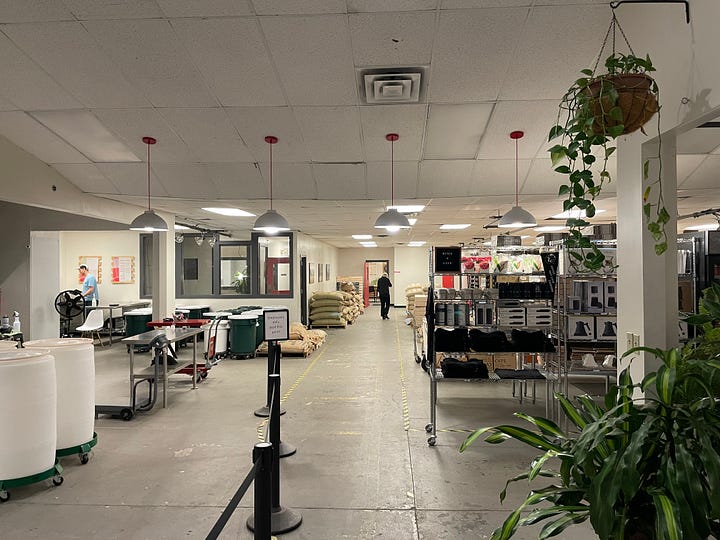
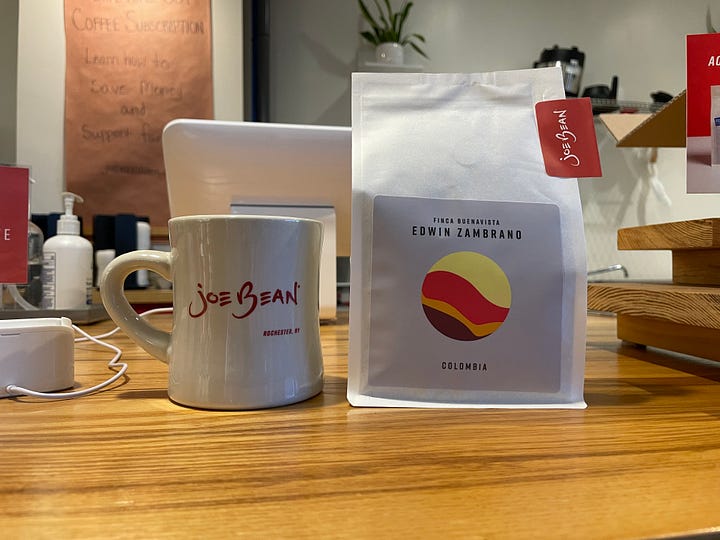

Good coffee prepared and served by knowledgeable people can completely reset your expectations. That has totally been my experience.
“People are used to drinking stale product,” Kathy said. “Like coffee is generally not fresh out there. Even a lot of what we do here as roasters is education. A lot of people don’t understand what roasters do. (Aside: I just raised my hand.) It’s a great opportunity for us to talk about what we do and how we source.
“Where does it come from, who is growing it, what are the issues they’re dealing with, what are we buying, what do you do with this coffee once you get it home.”
Humble beginnings
“We have a long history, Will,” Kathy offered with a hearty chuckle. “So I’ll give you the two-second version.” Even the two-second version, however, took about 10 minutes. It’s a fascinating tale, however, one filled with success, introspection, unexpected turns, and lots and lots of coffee. It really mirrors the ebbs and flows of the coffee and hospitality industries.
Photo: Joe Bean co-owners Dena Jones, Ben Turiano, and Kathy Turiano.
The first Joe Bean opened in the village of Webster in 2005. “It was a community place,” Kathy said. They didn’t roast their own coffee. They served coffee from Finger Lakes Roasters. It was largely focused on community events and serving food. But like a lot of small businesses it closed after it found itself fighting against large national chains. That led to the first Joe Bean pivot.
The coffee shop closure led to a period of introspection and education. The guiding thought: How can we continue to connect with our community but do it in a responsible, impactful way? Ben was in culinary school at this point and expressed interesting in joining the business. They really started from scratch by moving into the city of Rochester and opening a cafe/restaurant on University Avenue (right next to what is now Nine Maidens Brewing). That new Joe Bean became the first third-wave (specialty) coffee operation in Rochester. Before Joe Bean opened, specialty coffee didn’t have much of a presence in Rochester.
“If we were going to build a company, we had to have our own product,” Kathy said. She called this the Joe Bean “hiatus,” because “we were all in a sort of transitional time. It was a good time for us to learn, not just roasting but about specialty coffee and what was happening in the world of specialty coffee. But it wasn’t just about Rochester. There was a lot to learn and educate ourselves on.”
They went back to Coffee University.
“It was a whole world that we really didn’t understand.”
They re-opened in 2011 and Kathy credits Ben with “coming up with a lot of the model we used.” It was a coffee bar with a roaster housed within it. There was also a focus on locally sourced food and other beverages like wine and beer. They occupied that space for nearly eight years.
“It was a different coffee experience,” Kathy said. “We started using alternative brewing methods. Really talking to people about the coffee and the origin at a very different coffee experience.”
To spread the news, Joe Bean participated in a lot of collaborations, events, and showcases. That included one of my first experiences with coffee beer in this region — a Mocha Porter with Roc Brewing. It also led to collaborations with wineries, restaurants, and distilleries. (Have you ever had bourbon barrel-aged coffee?)
Worldly outlook
As they learned more and more about coffee, the Joe Bean team again worked to pivot. This came in the process of sourcing coffees and the search for a larger space to roast coffee. The Turianos changed how they were buying coffee, moving to select and acquire coffee in a more ethical and sustainable fashion. Over time, this brought them a greater understanding of some of the ways coffee farmers have (and continue to be) exploited, and how they could work in a way that would change that.
Photo: Coffee cherries on a tree in Colombia.
“Coffee is a pretty young industry and we got in at a unique time,” said Ben, who is largely responsible for roasting and green sourcing (the process of sourcing materials and commodities via eco-friendly means). “This idea of doing single origins and being specific about what farm you’re buying from or how it’s being processed, that stuff was all really, really new. We were trying to represent that here.”
They started purchasing from certified and fair-trade sources (mainly sourced through larger coffee importers). A trip to Nicaragua in 2012 really opened eyes and deepened understanding. This was paired with the realization that many of the certifying organizations never visited or inspected these farms, either.
“You read about this stuff but seeing it in person is a really different experience,” Ben said. “Stuff was done on paper, but the amount of leg work wasn’t what it claimed to be. So how can we feel good about what we’re doing? Trying to be more involved in the purchasing process and buying direct from the farmer, as direct as possible, that became the mission.
“It has taken us a long time to build those relationships.”
“It has really taken 10 years,” Kathy added. “We’re dealing with farmers that only have so much product. So relationships become even more important. They want to know that you’re trustworthy and in it for the long term. That’s really what Ben has spent 10 years doing.”
This really started the years-long process of forming bonds with farmers and upping their purchasing power through larger and larger orders. Ben said they contract with farmers years in advance, so product is ear-marked for them. “There’s a lot of inherent trust in that,” he added. While undergoing this shift in perspective, they realized the University Ave. space wasn’t right for what they wanted to do. (Simply put, all the equipment didn’t fit and the potential layout to showcase the roasting equipment didn’t make sense.)
“Sourcing and bringing the farmers to the forefront is really what we wanted to do,” Kathy said. “It was getting buried in all the other parts of the business.”
Meanwhile, they found a perfect blank canvas space nearby on Blossom Road in 2017, one that would allow them to expand the roasting operation and shift the focus more toward retail and wholesaling. It opened in late 2018. They’ve hosted some of their farming partners at the new space, too.
As it did for so many, the pandemic changed so much. “We knew that we wanted to go more online and broaden our customer base,” Kathy said. Joe Bean launched a seasonal subscription program (called Perpetual Joy) that is synced up to harvest seasons around the globe. (What could be cooler than getting coffee in the mail?) The in-store retail operation shrunk to make room for more storage and roasting. And it has just grown and grown.
The journey really continues to this day. Ben and Kathy are exceedingly proud of the farmers they’re partnering with and how they’re able to share those stories. Each coffee is named for the farmers who produced it.
My testimonial
If you’ve followed my writing for any duration during the past 10 years, you realize that my expertise and preferences extend to mainly beer and seltzer. Basically beverages with bubbles. I really need that carbonation. I’ll admit that I’ve never been a coffee drinker. I estimate I’ve had less than 10 full cups of coffee in my lifetime. It’s not because I don’t like, it’s just that I have never really sought it out. My wife drinks coffee every morning. She knows what she likes and I appreciate that.
So when Kathy offered me a cup of coffee before our interview last week, I quickly said yes. But I also deferred to her when it came down to what she would put in my mug. I only said, “Whatever you’re most excited about.” As we stood in front of the display of artisan, in-house roasted coffees, Kathy told me about the stories behind each of the single-origin coffees in the beautiful white packaging. That one over there, that one came from a farm in Nicaragua. Another was from Colombia. Each had a story. Kathy and Ben could tell you about the families behind each coffee and they were especially proud of the work that’s gone into forming and strengthening the bonds necessary to bring these coffees back to Rochester (and beyond through its online wholesale operation).
When you take a step back, you begin to realize that coffee isn’t all that dissimilar to beer. Terroir plays an incredible role in determining flavor profiles. It also leads to incredible stories. That’s one of the main draws to beer. I love knowing more about the people who make it. I want my work to take you beyond what’s in your glass and want it to showcase the hard-working folks who made it all possible, including farmers, maltsters, lawmakers, merchants, business owners, brewers, canning line operators, whomever. Coffee can be the same way.
The Turianos are my favorite kind of nerds – passionate, warm, friendly, and educated. They’ve experienced and learned a lot during 15 years in the coffee industry. It is that way for a lot of people who passionately work in the industry and those who choose to consume it. Not that I need another thing to nerd out about, but that’s what I really, really enjoyed and appreciated about my conversation with Ben and Kathy – I learned a ton, I got to ask some nerdy questions, and I gained a deeper appreciation about what was in my mug. And it goes without saying, the coffee was delicious as is. It didn’t need the enhancement of added sugar, milk, whatever. It didn’t have that expected acrid or green pepper characteristic that I’ve experienced in a lot of coffee beers. (We won’t even get into the reasoning behind that.) More than anything, it was just nice to enjoy a delicious beverage while engaged in a really thoughtful and fascinating conversation. That’s the kind of experience you can expect at Joe Bean and it illustrates why I’ll be back soon for my 12th cup of coffee.
MORE: You can learn more about Joe Bean at joebeanroasters.com or by visiting the storefront near the corner of South Winton and Blossom roads. The business is tucked behind the Walgreens and Aldi at the corner, located right in the same complex as ArtisanWorks. It’s open 8 a.m. to 5 p.m. Monday through Friday and is located at 575 Blossom Road, E1 in the city of Rochester.

